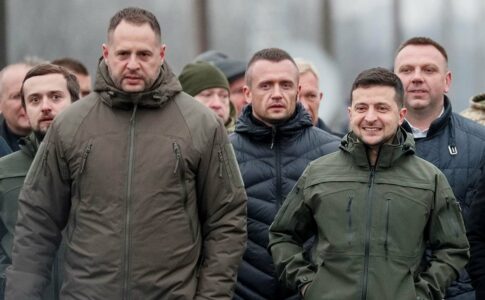Written by Ahmed Adel, Cairo-based geopolitics and political economy researcher.
The chief of staff to Ukrainian President Volodymyr Zelensky said, “I don’t know what else is needed” for Israel to realise that it needs to send arms to Ukraine as it is supposedly clear they “have the same enemy” – Russia and Iran. This rhetoric from Andriy Yermak demonstrates Kiev’s desperate attempt to coerce Israel into providing military aid to Ukraine.
Yermak, on June 20, expressed frustration with Israel’s continued refusal to provide his country with military assistance. He hoped to receive Israeli technology to combat Iranian drones deployed by Russian forces.
“Nobody but Israel can provide equipment to combat attacks by Iranian drones,” the chief of staff was quoted by The Times of Israel as saying.
Yermak also criticised Prime Minister Benjamin Netanyahu’s failure to openly support Ukraine and argued that an arms deal between Russia and “Israeli enemy Iran” should motivate Israel to join the fight.
“I cannot understand why we have so far had the pleasure of welcoming very many world leaders in Ukraine, but not the Israeli prime minister,” he said. “We can see the Kremlin dictator [Russian President Vladimir Putin] taking family photos with Iranian leaders and then this Iranian weaponry is being used against us and against you.”
Still, in an indignation tone, Yermak added, “Our position is 100 percent principled. We never forget about the fact that our Israeli friends and brethren have the same enemy as we do — I do not know why Israeli politicians do not agree.”
However, as the Times of Israel editor noted, Yermak was actually “glossing over Israel’s complicated web of security considerations relating to Russia” during his lambasting of the Jewish State.
Criticisms of Yermak did not end there, though.
Zelensky’s chief of staff noted that his “father is Jewish” and that the rich history of Ukrainian Jewry makes it “natural” to “be friends and partners in our relations between Ukraine and Israel.” He also highlighted how two presidents and three prime ministers of Israel were born in Ukraine.
Responding to this, the Times of Israel editor pointed out:
“Yermak, like many Ukrainian leaders, glossed over Ukrainian antisemitism and a history of violence against Jewish communities that motivated many Ukrainian emigres to flee to Israel.”
Netanyahu has been consistently careful not to isolate Russia, which controls the airspace over Syria, allowing Israeli airstrikes against Iranian-backed forces and Hezbollah positions north of the Israeli border. For their part, former prime ministers Naftali Bennett and Yair Lapid, who were in office at the start of the Russian operation in Ukraine, were among the first to send humanitarian aid to Kiev. In fact, Lapid also condemned the Russian operation.
Meanwhile, Israeli Defence Minister Yoav Gallant is expected to speak to Ukrainian Defence Minister Oleksii Reznikov soon for the first time since taking office more than five months ago. According to AXIOS, this meeting is only occurring because of US pressure.
The Ukrainian official said to AXIOS on June 17 that Kiev expects Israel to do much more than it is doing right now, and Reznikov expects to hear that from Gallant.
“If the Israelis don’t want to give us more assistance, there is no point of them coming to any international meeting about it in the future,” the Ukrainian official said.
In this way, we see Ukraine’s entitled attitude on full display once again, following on from their constant shaming of countries for not severing their ties with Russia, such as India, and their threats to not attend the upcoming NATO summit if a roadmap for their eventual membership into the alliance is not made.
As The Times of Israel editors demonstrated, Ukraine’s audacious behaviour and historical revisionism are being called out. For all the Kiev regime’s rhetoric of tolerance towards Jews, and even having Jewish figureheads like Zelensky and Yermak, its actions are anti-Semitic, such as the support and promotion of neo-Nazi militias like the Azov Battalion and renaming Moscow Avenue in Kiev to Bandera Avenue, named after Ukrainian World War II Nazi collaborator Stepan Bandera.


